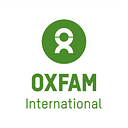Business and Human Rights Forum 2019: Urgent Action Needed to End Human Suffering in Global Supply Chains
Representatives of governments, business and civil society will meet in Geneva for the UN Forum on Business and Human Rights on Nov 25–27. Here’s Oxfam’s take on what they need to do — and why.
It is commonplace — and scandalous — that millions of workers around the world are facing poverty pay, harsh working conditions, gender discrimination and other human rights abuses on the farms and plantations supplying big brand supermarkets such as Aldi, Lidl, Whole Foods and Dutch retailer Plus.
Oxfam assessed the supply chain policies of 16 of the largest retailers in Europe and the US and found none of them were strong enough to properly protect the people who produce our food. We are running a public campaign to push these companies to make moves to improve. They are starting to act, which could make real differences in the lives of workers and small-scale farmers who produce our food. Nevertheless, they remain in control of how far they are prepared to go and how fast.
We appreciate it takes strong CEO leadership for a company to do fundamentally more than “tick the right boxes” because they are all in competition with one another. They cannot turn things around solely on their own.
But this is not uniquely a supermarket problem. Our campaign bears lessons for all businesses and — ultimately — governments. This year’s UN Forum on Business and Human Rights is discussing “Governments as catalysts for business respect for human rights.” The discussion is the right one — but the title will count for little unless all parties step forward and act.
France’s Duty of Vigilance law (2017), the United Kingdom’s Modern Slavery Act (2015), the Netherlands’ Child labour Due Diligence Law and the California Transparency in Supply Chain Act (2010) are all good examples of governments starting to hold corporations accountable for their human rights impacts.
It is essential that the European Union now engage too; it has been very slow to the table, but discussions are now beginning.
Lessons for human rights
In the decade Oxfam has been working in this field, we have learned a number of lessons which policy makers should take on board.
The voluntary UN Guiding Principles on Business and Human Rights along with a growing set of due-diligence laws are helping to set the stage for companies to show more respect toward human rights. But concrete guidance about how to conduct human rights due diligence is still missing. It is a vacuum that has resulted in uneven practices on the ground.
Affected people and communities must be front and center of any due diligence efforts for them to be meaningful and successful. Oxfam has spent a decade supporting a community-based human rights impact assessment tool (called COBHRAs) that helps to ensure local people can determine the issues that matter to them and develop solutions that make sense to their context.
Some of the new laws that are being implemented, while welcome, are too narrowly focused and this can hide other human rights abuses. For example, a law focused, say, solely on child labor may miss the fact that a child’s right to food has been lost when her poorly paid mother can’t feed the family. Human rights are inter-related and lawmakers must view them holistically.
Human rights law must cover the entirety of a company’s supply chain. We understand this is challenging especially when a company has many suppliers — but it is always possible, as we’ve shown in recent research on the Italian processed tomato sector where one company took a deep-dive into one of its many supply chains. Our study showed that the way in which companies set prices, how they negotiate contracts and use their differential bargaining power down the chain is directly related to human rights abuses. Companies should open up the commercial data behind their supply chains to help examine this. We have worked with the Finnish company SOK Corporation to use this kind of information in ways that do not breach commercial sensitivity.
Women particularly are always hit disproportionately harder from supply chain abuses because they often face added discrimination, both in law and by harmful social norms and practices. Human rights due diligence needs to be grounded in gendered sensitivities without any exception — it will fail in the most profound ways if not.
It is not enough for companies to simply say they have done due diligence. They must be transparent about it. Local people have the right to be informed of any risks that a due diligence process uncovers and what’s being done to resolve them — because they are often best placed to monitor what happens on the ground and hold the company to account. Laws must also be clear about how they will be enforced and, if broken, what sanctions will be imposed to hold a company liable.
For years governments have shied away from legislating on corporate supply chains. This year’s Business and Human Rights Forum turns the spotlight firmly back onto them. Governments need to compel companies to carry out meaningful human rights due diligence and call them to account if they fail. This is a crucial matter to get right if we are to meet the UN’s Sustainable Development Goals.
Europe can make a big difference. The new European Commission takes office on 1 December and should propose legislation that will apply to all companies operating in the EU, the world’s largest unified market and aligns efforts from single European countries. We will be watching and ready to celebrate progress.
Read more: Thousands push supermarket Lidl for more action on human rights: “No human suffering in our food”
By Chema Vera (@Chema_Vera), Acting Executive Director, Oxfam International.
